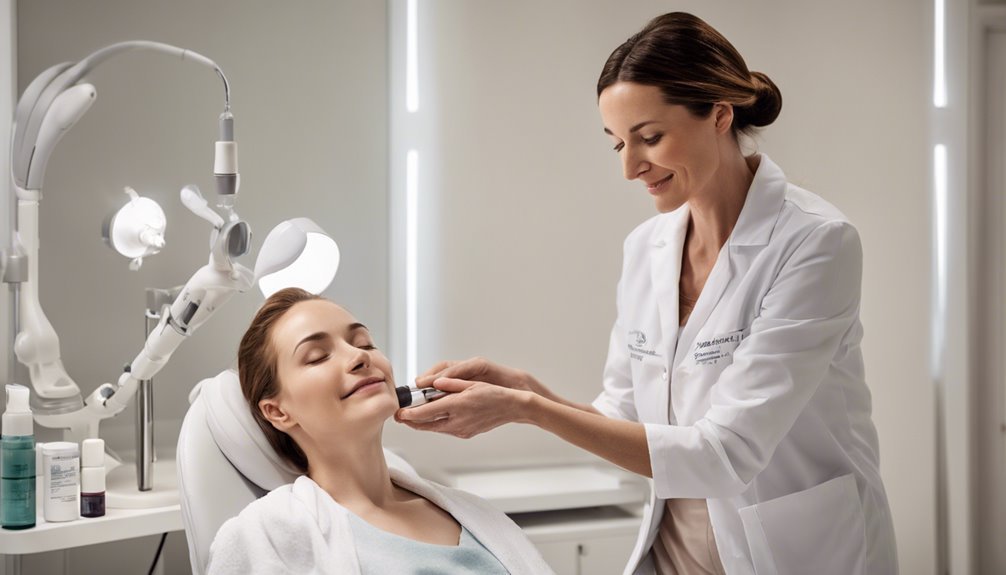After the joys of bringing a new life into the world, you might find that your body's bounce-back isn't as resilient as you'd hoped. You're not alone in this, and there are effective strategies you can employ to increase skin elasticity. By integrating foods rich in collagen, staying hydrated, and adopting a tailored skincare routine, you're on the right path. However, the nuances of how these elements work together can make a significant difference in your results. What if there were specific combinations of nutrients and routines that could enhance your skin's recovery even further? Let's explore how.
Key Takeaways
- Incorporate foods high in vitamins and antioxidants like blueberries, oranges, and spinach to boost collagen synthesis and skin repair.
- Stay hydrated by drinking at least eight glasses of water daily to maintain optimal skin moisture and elasticity.
- Use moisturizers enriched with hyaluronic acid, shea butter, and ceramides to enhance skin firmness and elasticity.
- Engage in regular massage therapy to improve blood circulation and decrease cortisol levels, supporting collagen and elastin health.
- Consider professional treatments like microneedling or laser therapy to stimulate collagen production and improve skin elasticity.
Understanding Skin Elasticity Changes
Skin elasticity, the skin's ability to stretch and return to its original shape, often changes significantly after pregnancy. This alteration is largely driven by hormonal changes and the physical demands placed on your skin.
During pregnancy, hormones such as estrogen and progesterone rise, which can increase the hydration and pliability of your skin. However, they also affect the fibres in your skin structure, primarily collagen and elastin, which are crucial for maintaining skin's elasticity.
As you navigate post-pregnancy, you'll notice your hormone levels gradually returning to their pre-pregnancy state. This shift can cause a decrease in skin elasticity as the supportive structure of collagen and elastin fibers begin to stabilize but may not fully recover to their original form.
The stretching of the skin, especially over the abdomen, can result in areas where the skin may appear less firm and less elastic.
Understanding this transformation is vital to empathize with and support others experiencing similar changes. By acknowledging the scientific basis behind these skin changes, you can better assist those seeking to improve their skin's elasticity.
Offering knowledge and support can be incredibly impactful for someone adjusting to their new body post-pregnancy.
Hydration for Skin Health
Maintaining adequate hydration is crucial for enhancing skin elasticity, particularly after the rigors of pregnancy. As you navigate the journey of motherhood, understanding the hydration benefits for your skin is essential. Increased water intake supports the dermal layers, improving their ability to bounce back and maintain smoothness. This process is vital as your skin adjusts and recovers post-baby.
Water serves as a building block for skin cells, facilitating the transport of nutrients and the removal of toxins. It aids in maintaining moisture levels, which can be particularly challenging during the postpartum period. Hydration helps to replenish skin tissues and increase its overall resilience against external factors, such as dryness and environmental pollutants.
To optimize your skin health, aim to consume at least eight glasses of water daily. You might find it helpful to carry a water bottle throughout the day as a reminder.
Remember, your water intake is a key component in your skin's health and its ability to retain elasticity. By staying adequately hydrated, you're not only caring for your skin but also enhancing your overall well-being.
Make hydration a priority to see significant improvements in your skin's texture and elasticity.
Nutrient-Rich Diet Recommendations

Transitioning to a nutrient-rich diet is essential for boosting skin elasticity after childbirth. You'll want to focus on superfoods, which are packed with vitamins, minerals, and antioxidants that support skin health. Understanding nutrient timing can also enhance the benefits, helping your body to optimize the absorption of these crucial nutrients.
Incorporating a variety of foods is key. Here's a quick guide on what to include in your diet:
| Food Category | Examples | Benefits for Skin |
|---|---|---|
| Fruits | Blueberries, Oranges | High in Vitamin C, promotes collagen synthesis |
| Vegetables | Spinach, Sweet Potatoes | Rich in beta-carotene and iron, essential for skin repair |
| Proteins | Salmon, Almonds | Contains omega-3 and zinc, vital for skin elasticity |
For instance, integrating salmon into your meals provides omega-3 fatty acids, which are critical for maintaining skin integrity and moisture. Almonds are a great snack, offering zinc that helps in new cell production and natural skin tightening.
Importance of Collagen and Elastin
Your body's ability to produce collagen and elastin is crucial for maintaining skin elasticity, particularly after pregnancy. These proteins are foundational to your skin's structure, helping it to stretch and bounce back. During and after pregnancy, your body undergoes significant changes that can affect these protein levels, potentially leading to decreased skin elasticity.
Collagen, the most abundant protein in your body, provides the skin with firmness and strength. After childbirth, boosting collagen production can significantly help in regaining your skin's youthful appearance. Collagen supplements are often recommended as they supply your body with the necessary amino acids to support natural collagen synthesis.
Elastin, on the other hand, allows your skin to return to its original position when it's poked or pinched. Integrating elastin boosters into your postpartum care can be beneficial in enhancing this critical property of your skin. These boosters support the skin's ability to extend and retract, crucial for recovering from the stretching it endures during pregnancy.
Incorporating both collagen supplements and elastin boosters can synergistically enhance your skin's resilience and elasticity, helping you feel and look your best as you nurture your new baby.
Effective Skin Moisturizing Practices
Effective moisturizing practices are essential for enhancing your skin's elasticity, especially after pregnancy. Choosing the right moisturizer ingredients and mastering application techniques can significantly impact your skin's health and appearance.
Look for products containing hyaluronic acid, shea butter, and ceramides. These ingredients are known for their ability to hydrate deeply and reinforce the skin's barrier, preventing moisture loss.
When applying moisturizer, use gentle, upward strokes. This technique not only ensures even distribution but also stimulates blood flow, which is crucial for nourishing skin cells. Apply moisturizer immediately after bathing to lock in moisture.
Don't overlook areas like the abdomen, hips, and breasts, which are particularly susceptible to postpartum skin changes.
Additionally, consider layering products for optimal effect. Start with a water-based product like a hydrating serum followed by a heavier, oil-based cream. This method helps to layer moisture and active ingredients effectively.
Targeted Postpartum Exercises
After childbirth, incorporating targeted postpartum exercises can significantly enhance your skin's elasticity by improving muscle tone and circulation beneath the skin.
Focusing on core strength and the pelvic floor is crucial. These areas are greatly impacted during pregnancy and childbirth, and restoring their function can't only boost your physical health but also improve the quality and appearance of your skin.
Begin with pelvic floor exercises, often referred to as Kegels, which involve tightening and releasing the muscles you'd use to stop urinating.
Strengthening these muscles helps support your uterus, bladder, and bowels, and improves circulation in the pelvic area, promoting healthier, more elastic skin.
Additionally, engage in core-strengthening exercises like abdominal bracing, which involves pulling your belly button towards your spine and holding the position.
This simple exercise activates all layers of the abdominal muscles without straining the back. It's gentle yet effective, perfect for easing back
Benefits of Massage Therapy

Incorporating massage therapy into your postpartum recovery can significantly enhance skin elasticity. This technique not only helps in tightening your skin but also improves blood circulation, ensuring essential nutrients reach the skin cells effectively.
By stimulating the production of collagen, a key protein responsible for skin elasticity, massage therapy plays a crucial role in rejuvenating your skin's youthful appearance.
Additionally, the integration of aromatherapy in massage sessions offers profound aromatherapy benefits. Essential oils like lavender, chamomile, and rose promote deeper relaxation, reducing stress levels which can adversely affect skin health.
These oils facilitate the body's natural healing processes, further aiding in the improvement of skin elasticity.
Emphasizing postpartum relaxation, massage therapy provides a dual benefit. It serves as a therapeutic escape, allowing you to destress and focus on self-care, which is vital during the postpartum period.
This relaxation effect can also prevent the buildup of cortisol, a stress hormone that can degrade collagen and elastin in the skin.
Safe Use of Skin Firming Products
Why consider skin firming products as part of your post-baby recovery regimen? After childbirth, your skin may have lost some of its elasticity due to the stretching it underwent. Using skin firming products can help tighten and improve your skin's overall texture.
However, it's crucial to focus on product safety and the quality of ingredients to ensure they support your skin's health without causing harm.
When selecting skin firming products, look for those that contain natural ingredients known for their efficacy and safety. Ingredients like collagen, elastin, and hyaluronic acid are beneficial as they naturally occur in the skin and help to maintain its firmness and hydration.
Additionally, plant extracts such as aloe vera, green tea, and witch hazel can soothe and tighten the skin effectively.
Always check for clinical trials or scientific studies backing the product claims. This step ensures that the product has been evaluated for its safety and effectiveness.
Moreover, opt for products free from harmful chemicals such as parabens, phthalates, and sulfates, which can be harsh on sensitive post-pregnancy skin.
Role of Sun Protection

Protecting your skin from the sun is crucial, especially after pregnancy, as your skin is more susceptible to damage and aging from UV rays.
Sun protection benefits aren't just about preventing sunburn; they extend to maintaining the integrity and youthful appearance of your skin. Exposure to UV damage accelerates the breakdown of collagen and elastin—key components that give your skin its elasticity and firmness.
To effectively shield your skin, consider these steps:
- Use Broad-Spectrum Sunscreen: Choose a sunscreen that offers broad-spectrum protection with at least SPF 30. Apply it generously on all exposed skin, including the neck, hands, and face, every day, irrespective of the weather.
- Wear Protective Clothing: Long-sleeved shirts, pants, and wide-brimmed hats can provide an additional layer of defense against the sun's harmful rays. Opt for clothing with UV protection for enhanced safety.
- Seek Shade: Whenever possible, stay under shade especially during peak sun hours between 10 a.m. and 4 p.m. This reduces the direct exposure to UV rays, which can be particularly intense during these hours.
Incorporating these sun protection strategies helps safeguard your skin's elasticity and overall health post-pregnancy.
Importance of Adequate Sleep
While adjusting to life post-baby, ensuring you get enough sleep is essential for maintaining skin elasticity. Adequate sleep supports the body's ability to repair and regenerate skin cells, which is crucial for improving skin texture and firmness that may have been affected during pregnancy.
Developing consistent sleep routines can significantly enhance your sleep quality. Aim to go to bed and wake up at the same time every day, even on weekends. This regularity helps regulate your body's internal clock, leading to better overall sleep.
Avoid stimulants like caffeine close to bedtime and create a bedtime ritual that signals to your body it's time to wind down, such as reading or a warm bath.
Moreover, quality sleep promotes the release of growth hormones, which are vital for collagen production. Collagen is a key component in maintaining skin elasticity and structure.
Without sufficient sleep, your body produces more cortisol, a stress hormone that can break down collagen, leading to skin that loses its firmness and elasticity more rapidly.
Professional Treatments and Therapies

Several professional treatments and therapies can significantly enhance skin elasticity after childbirth. You might feel overwhelmed by the options available, but understanding each treatment's benefits can guide you to the right choice.
1. Laser Treatments: These involve using focused light to stimulate collagen production in your skin layers. The process helps tighten loose skin and can remarkably improve elasticity. Laser Treatments are non-invasive and typically require multiple sessions for the best results.
2. Radiofrequency Therapy: This therapy uses energy waves to heat the deep layer of your skin, known as the dermis. This heat encourages collagen and elastin production, which are crucial for firm, elastic skin.
Radiofrequency therapy is especially beneficial because it provides gradual improvement, making it a less invasive option with minimal downtime.
3. Microneedling Sessions: During microneedling, tiny needles create micro-injuries on the skin, which trigger the body's natural healing process, enhancing collagen production. This treatment is effective for tightening and rejuvenating the skin.
Combining microneedling with topical treatments can enhance the effects.
Additionally, ultrasound therapy is another option that uses sound waves to target deep tissues, promoting collagen elasticity. Each of these therapies offers a specialized approach to improving skin elasticity, so consider your specific needs and consult with a professional to determine which treatment is best for you.
Monitoring Progress and Adjustments
After selecting a professional treatment to enhance your skin's elasticity post-baby, it's crucial to monitor the changes and make necessary adjustments to your treatment plan.
Implementing effective progress tracking can significantly influence the outcomes. You'll want to regularly document the texture, tone, and overall appearance of your skin through photographs and detailed notes. These records serve as a baseline to evaluate the efficacy of the treatments over time.
As you observe your skin's response, be prepared to discuss these findings with your dermatologist or skincare professional. They can offer expert insights and suggest adjustment strategies to optimize your regimen.
Perhaps an increase in treatment frequency or the integration of a new topical agent might be recommended based on your progress.
Remember, skin recovery post-pregnancy varies individually, and flexibility in your approach is key.
Don't hesitate to voice any concerns or unexpected changes in your skin to your provider. Regular consultations ensure that your treatment remains aligned with your skin's evolving needs, maximizing the potential for improved elasticity.
Frequently Asked Questions
Can Breastfeeding Impact Skin Elasticity?
Breastfeeding can affect your skin elasticity indirectly through hormonal changes.
During lactation, your body maintains higher levels of certain hormones like prolactin and oxytocin, which can influence skin quality.
While the direct impact on skin elasticity isn't well-established, the overall breastfeeding benefits include hormonal balance, which supports skin health.
To serve your body well during this time, consider integrating a nutritious diet and hydration to enhance these effects.
How Does Stress Affect Post-Baby Skin Recovery?
Navigating the stormy seas of stress can hinder your skin's voyage back to its pre-pregnancy glory.
Stress management is crucial as it may exacerbate hormonal changes that impede skin recovery. Techniques like mindfulness and adequate sleep can stabilize your hormones, promoting healing.
Focusing on nurturing your well-being not only serves your health but also allows you to better serve those you care for, enhancing your skin's ability to regain its elasticity.
Are There Genetic Factors Influencing Skin Elasticity?
Yes, genetic factors do play a significant role in skin elasticity.
Your genetic predisposition can affect how your skin rebounds and rejuvenates after changes, including childbirth.
If your family has a history of resilient skin, you're more likely to experience quicker skin recovery.
Understanding your genetic background can help tailor a skin care regime that effectively supports skin elasticity and promotes overall skin health, benefiting not just you but those you serve.
Can Allergies Affect Skin Elasticity Treatments?
Yes, allergies can impact the effectiveness of skin elasticity treatments.
Depending on your allergy types, certain ingredients in topical treatments or supplements might trigger reactions, reducing their efficacy or complicating your skin's healing process.
It's crucial to tailor treatment options to avoid allergens and consult with a dermatologist who understands these nuances.
This approach ensures you receive safe, effective care, ultimately serving your skin's health and resilience optimally.
How Does Smoking Influence Skin Recovery Post-Baby?
Smoking significantly hampers your skin's ability to heal after childbirth.
The chemicals in cigarettes impair blood flow, reducing oxygen and nutrient delivery to your skin. This results in slower collagen production, crucial for skin elasticity and repair.
To aid recovery, you'd benefit from quitting smoking, ensuring better skin healing and overall health improvements.
Embracing this change not only serves your well-being but also sets a positive example for those you care about.
Conclusion
As you embark on this journey to rejuvenate your skin post-baby, imagine yourself as a gardener, tending to a precious plant. Just as a plant needs the right soil, sunlight, and water to thrive, your skin requires a blend of nutrients, hydration, and care to regain its elasticity. By adopting these healthy practices, you're nurturing your body's natural ability to heal and flourish, ensuring that your skin can bounce back as beautifully as a well-cared-for garden.




